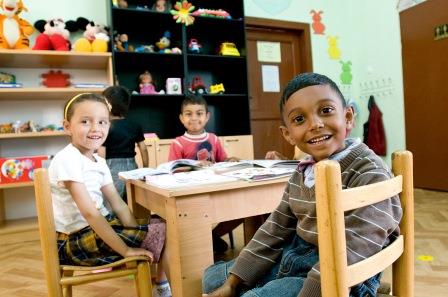![]() (2 MB) Education Program Overview
(2 MB) Education Program Overview
THE CHALLENGE
Macedonia lags behind other transitioning countries in educational performance, work readiness, ethnic integration among youth, and inclusion of children with disabilities in mainstream education.
PROJECT AREAS
USAID works with the Ministry of Education and Science to ensure that young students develop early reading proficiency and comprehension, students and teachers integrate across ethnic lines, and that there is an inclusive learning environment for students with disabilities. Since 2002, USAID has implemented programs in all levels of the education system - primary, secondary, and university.
Inter-cultural Education
The Interethnic Integration in Education Project (2012-2017) is raising awareness of the need for integration and helping to create effective learning environments for all of Macedonia’s learners. USAID promotes understanding between ethnic groups and mitigates increasing school segregation through: outreach and communication; capacity strengthening of school management and teachers; establishing model schools that demonstrate bilingual and interethnic education; and refurbishing schools as an incentive to participate in reform efforts. All primary and secondary schools in Macedonia are part of project activities, which engage municipalities, parents and local communities in the process. Sixty-three schools have been renovated with U.S. European Command funding as a part of the project.
Early Reading and Comprehension
The Readers are Leaders Project (2013-2017) works with the all primary schools across the country and relevant education institutions to strengthen early primary school student literacy and numeracy skills, and the systems used to assess these skills. The project’s mobile library and interactive reading and math events with celebrities help develop enthusiasm for foundational reading and math skills.
Inclusive Education
USAID is partnering with the Lions Club International Foundation to implement the Children with Visual Impairments Project (2014-2019). The project works to increase the quality and accessibility of education services, provide individual support to children with visual impairments, and facilitates early eye-screenings. By equipping five resource centers, publishing all standard primary school textbooks in Braille, and raising public awareness, the project is ensuring that those with visual impairment have equal access to education and job opportunities.
The Social Inclusion through Technology (SIT) project (2016 – 2018), works with youth with various disabilities who have an interest in developing a career in the ICT sector to strengthen soft, business, and IT skills through on-line trainings and with the help of mentors. After completion of the training modules and certification, participants will be eligible to apply for internships with ICT companies which may lead to new employment opportunities in this fast-growing sector
RECENTLY COMPLETED PROJECTS
USAID worked to address Macedonia’s high rate of unemployment with efforts to match the skills workers have with those needed by the current labor market. The Youth Employability Skills (YES) Network Project worked with secondary schools, the Employment Service Agency, and youth-serving NGOs to provide youth aged 15 to 27 with soft skills training, work-based learning experiences, and career coaching. The YES Network worked to revitalize the job clubs of the National Employment Service Agency and establish Local Economic and Social Councils (public-private collaborations), which analyze and address local workforce challenges.
In cooperation with key Macedonian educational institutions, the Teacher Career and Professional Development Project developed a system based on standards for quality teaching, accurate and transparent teacher assessment, and focused professional development for educators.
The Roma Education Project provided comprehensive educational support for increasing school retention and academic achievement of Roma youth. Through four Roma Education Centers in different communities, USAID helped preschool students prepare for primary school and provided after-school tutoring for primary school students. While USAID worked with parents and Roma communities to raise awareness of the importance of education, it also trained teachers in intercultural education and managing diversity, and helped schools improve facilities. Since 2009, the Government of Macedonia has been fully funding and managing the secondary scholarship and mentoring program for Roma youth.
USAID launched the E-Accessibility Project in 2010. In partnership with relevant national educational authorities, this project provided assistive computer peripherals and accessible educational software to 31 primary and two secondary schools. It trained teachers in how to use assistive technology for disabled students, produced a variety of resource materials, and provided ongoing guidance. These pioneering activities raised the profile of assistive technology as a tool for inclusion of students with disabilities in mainstream education.
SELECTED RESULTS
- Renovated 193 primary and secondary schools country-wide, in collaboration with the U.S. Department of Defense.
- Helped vocational schools and the Employment Serivces Agency improve the work-readiness skills of youth which resulted in 1,500 jobs for youth.
- Supported the founding of the semi-private South East European University, the first multilingual university in the region.
- Improved the educational performance of over 1,500 Roma students.
- Conducted over 10,000 preventive eye-screenings of young children.
- Introduced assistive technologies (hardware and software) in selected schools to support inclusion of students. with disabilities








Comment
Make a general inquiry or suggest an improvement.